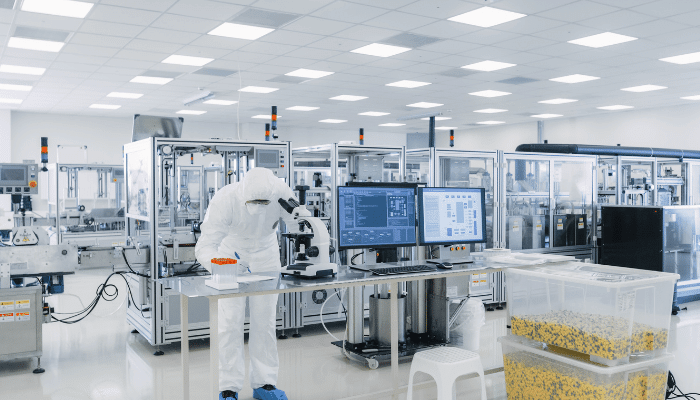What is IoT in Manufacturing?
Simply put, the Internet of Things (IoT) is the use of tools to gather data from manufacturing equipment, people, and other systems to get the right information to the people and machines who need it, where they need it, and when they need it. The idea of this right information in the right hands then enables those people to create the best products possible at the lowest cost and highest quality possible, on time for the manufacturer’s customers.
Manufacturers use IoT to eliminate paper and digitize their entire factory, which means real-time data from the shop floor and other areas of the factory. Data acquired via IoT-enabled equipment will be precise, detailed, and delivered instantly. Machine automation, in part, enabled through IoT, allows machines to take over small tasks that would otherwise require time from an operator and creates a fully connected factory in which all people and machines are connected and sharing the same information. Everyone and everything knows exactly what is happening on the plant floor at all times, in real-time. There is tremendous value in connecting modern technology with your manufacturing shop floor, and in this article, we dive deeper into that idea.
How IoT Contributes to Better Manufacturing
Automate tasks
IoT systems equip your machines with smart technology, automating shop-floor equipment to take over tasks that otherwise would have to be done by a human. This frees up time for operators who can now focus on higher-level, more valuable tasks like continuous improvement of their manufacturing process. This is much more beneficial than having to perform tasks such as turning a knob to increase the speed of a motor or press a button to adjust the temperature. Let your machines handle these types of tasks.
Creates new jobs
Additional machine automation often brings concerns that jobs will be lost. Although automation will allow machines to take over more tasks, it rarely decreases the number of jobs. Instead, operators will have an adjusted focus or will be busy managing increased throughput! There will also be a growing demand for people that can analyze the data that is being received from machines or that can use already-analyzed data (i.e., analyzed in an IIoT platform) to make fewer adjustments to how equipment is running.
Real-Time Analytics
Why is eliminating paper such a big deal? Simple, paper takes time to travel around the plant before its data is entered and converted into useful metrics- it’s just not efficient. Also, paper forms and reports introduce multiple opportunities for data errors and mistakes. With a good IoT solution setup, you can pull data directly from the source (the machine). This way you get the most accurate and the most current information. Instantly identify problems and trends, and start making adjustments immediately, instead of making decisions based on hopefully accurate data from yesterday or last week.
Machine learning
Technology is constantly advancing, and IoT in manufacturing is no exception. With the help of devices that are equipped with Industry 4.0 connectivity, sufficient historical data, and machine learning tools at the edge or in the cloud, machines will start to identify patterns, learn tendencies on each machine, and truly learn how to make better decisions. Your whole plant floor will get smarter. Big data analytics also ties into this idea. By recording and analyzing large amounts of data on machine performance over time, your smart machines will be able to avoid issues that have been experienced in the past. This makes for a smoother production process and assists with more maintenance practices. It’s no secret that downtime gets expensive so doing everything you can to keep your machines running optimally is a must.
Better Customer Relationships
With these proper IoT protocols, you will have accurate data on which to base your decisions. You can then more accurately estimate when orders will be delivered to customers. Over time you will develop a better understanding of how long each task takes in your production process, how much scheduled or unscheduled downtime you might run into, and you will be able to provide more detailed, data-based information and answers to your customers. Essentially, you are eliminating all guesswork. Your customers will be happier when they know what is going on, and they receive their order on time as promised.
Does New Technology Require You to Reinvent your Factory?
The best part of implementing IoT is that none of this requires major changes to your shop-floor. Smart Manufacturing sensors can be added to any equipment, even those from the last century. There are many devices and systems out there that can help you get all of these features and much more, for a very reasonable investment.
The manufacturing sector is headed towards Industry 4.0 and is recognizing the importance of connectivity. Investing in Industry 4.0 capable devices will not only help you get the most out of your machines but will provide a competitive advantage moving forward. A large number of manufacturer’s equipment is running at about a third of its possible overall equipment effectiveness (OEE). IoT can ensure that your equipment is running at peak performance.
Conclusion
IoT in manufacturing is an important concept that we will see more and more of as time goes on. There are many benefits of automating your manufacturing process; including decreased downtime, improved decision-making, and quick adjustments to deliver on-time to your customers. The companies that are adopting these technologies now are industry leaders to be watched!
If you enjoyed this article, check out one of our other articles titled What is Industry 4.0, and how does it help you? This article describes the history of Industry 4.0 and how we believe it will affect the future of the manufacturing industry. At Ectobox we specialize in Industrial Intelligence solutions – if you would like to learn more, subscribe to our newsletter from the menu on the right-hand side of this page.






